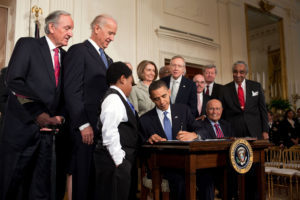Senate Republicans took a dramatic step toward fulfilling their promise to repeal the Affordable Care Act on Tuesday by approving a motion to begin debate on a health care overhaul.
The 50-50 vote on the procedural motion forced a tie-breaking vote by Vice President Mike Pence.

Sen. John McCain, Republican of Arizona, returned to the Capitol on Tuesday after recently undergoing brain surgery in his home state. He cast a crucial vote to let the measure proceed.
The outcome represents at least a partial victory for President Trump, Senate Majority Leader Mitch McConnell and others who have sought to repeal the ACA — a longtime promise by congressional Republicans.
The vote sets up an emotional battle over the future of health care in the U.S.
All Democrats, as expected, voted against the Senate motion.
Two Republican senators also voted against the motion to begin debate: Susan Collins of Maine and Lisa Murkowski of Alaska. Both GOP senators from Georgia, Johnny Isakson and David Perdue, voted for the procedural move.
What happens next is unclear.
The first vote is on the health care legislation that the U.S. House passed in May. But the Senate has not considered that bill, instead crafting their own version. The House bill is not expected to survive in its current form because there will be an amendment process that will essentially replace the bill.
The Senate is expected to vote on a straight repeal bill, their GOP plan, and a “skinny repeal” measure that would make fewer changes to existing law, such as eliminating the requirement for most individuals to have coverage or pay a tax penalty.

Millions of Americans are projected to become uninsured as a result of the health care legislation potentially in play in the Senate. That includes estimates of 680,000 to 1 million Georgians. Many of the uninsured would come from large federal funding cuts to the Medicaid program, which covers roughly 2 million poor and disabled Georgians.
The GOP effort to repeal and replace the Affordable Care Act isn’t a popular measure. A Kaiser Family Foundation poll earlier this month found that 71 percent of the public, including nearly all Democrats and 72 percent of Independents, favor a bipartisan effort to improve the ACA, rather than Republicans continuing their efforts to repeal it.
The poll found 46 percent of Trump supporters say they want to see Republicans work with Democrats to improve the ACA — statistically tied with the 47 percent who would rather see Republicans continue working on their own plan to repeal and replace it.
Protesters in the chamber gallery Tuesday shouted “Kill the bill’’ before the Senate vote.
The Senate held no public hearings on its own legislation, which was written behind closed doors.
Medical groups have come out strongly against the GOP effort.

David Barbe, the president of the American Medical Association, challenged the claims Senate GOP leaders have made about their legislation to unravel large parts of the ACA.
“It does not make care more affordable to low-income Americans,” Barbe said, according to the Washington Post. “It does not reduce out-of-pocket costs. It could trigger substantial increases for patients with pre-existing conditions.”
The American Hospital Association on Tuesday urged senators to reject legislation to repeal and replace the ACA. After the vote, the group’s CEO, Rick Pollack, said that “any legislative efforts that entail devastating cuts to the Medicaid program or coverage losses will be opposed with the same vigor that was responsible for the Senate’s inability to debate [health care legislation] until now.”
Laura Colbert of consumer group Georgians for a Healthy Future said, “We are disappointed that the Senate has chosen to move forward on proposals that so clearly threaten the coverage and access that Georgia consumers and patients rely on every day.”

President Trump earlier Tuesday framed the day’s vote as pivotal. “After 7 years of talking,” he said in a tweet, “we will soon see whether or not Republicans are willing to step up to the plate!”
“So great that John McCain is coming back to vote. Brave – American hero! Thank you John,” tweeted Trump, who had criticized McCain, a war veteran and former POW, during the 2016 presidential campaign.
McCain is battling glioblastoma, an aggressive type of brain cancer that is difficult to treat.
He addressed his Senate colleagues after the vote, urging them to “return to regular order” to craft a new health care bill.
“I will not vote for this bill as it is today,” McCain said, and if it fails “as seems likely,” that the Senate should go back to the drawing board, with hearings, mark-ups and consultation with Democrats.
“Let the Health, Education, Labor, and Pensions Committee under Chairman [Lamar] Alexander and Ranking Member [Patty] Murray hold hearings, try to report a bill out of committee with contributions from both sides,’’ McCain said. “Then bring it to the floor for amendment and debate, and see if we can pass something that will be imperfect, full of compromises, and not very pleasing to implacable partisans on either side, but that might provide workable solutions to problems Americans are struggling with today.”
Georgia Lt. Gov. Casey Cagle, a Republican running for governor, said in a statement that he supported the votes of Isakson and Perdue.
“The leadership of Sens. Isakson and Perdue today brings us one step closer to repealing Obamacare with a plan that’s better for Georgia,” Cagle said. “Voters should know that our senators are working on provisions that give a fair deal to states such as Georgia that didn’t expand Medicaid. That’s critical. Our state shouldn’t get less money than other states because we took the conservative, fiscally responsible course.”
Later Tuesday evening, though, a comprehensive plan to replace the ACA fell far short of the votes it needed. The Senate tally on the proposal needed to reach 60 votes to overcome a parliamentary objection. Instead, it fell 43-57.

